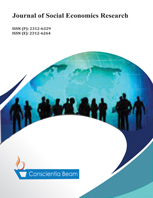Asymmetric effects of international trade and foreign direct investment on economic growth: Empirical evidence from Vietnam
DOI:
https://doi.org/10.18488/35.v11i2.3704Abstract
The research focuses on analyzing the non-linear effects of international commerce and foreign direct investment (FDI) on the economic growth of Vietnam. This study utilizes the Nonlinear Autoregressive Distributed Lag (NARDL) model to examine the asymmetric impacts of international trade and foreign investment on the Vietnamese economic growth from the first quarter of 2008 to the fourth quarter of 2021. The findings suggest that a rise in foreign investment during the first phase has favorable outcomes for economic growth, with a reported impact of 53%. Nevertheless, it is important to note that FDI does not only contribute to the enhancement of economic development. According to reports, foreign investment has a negative impact of 13% on the rate of economic growth when it exceeds a certain threshold. However, the results of the research also indicate that Vietnam continues to face certain negative implications as a result of international commerce. The study highlights the importance for developing nations, such as Vietnam, to practice prudence in their trade endeavors and the influx of foreign investments to mitigate any negative repercussions on their economies. These insights underscore the significance of strategic economic planning and policy formulation in navigating the complexities of global economic interactions.

